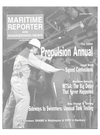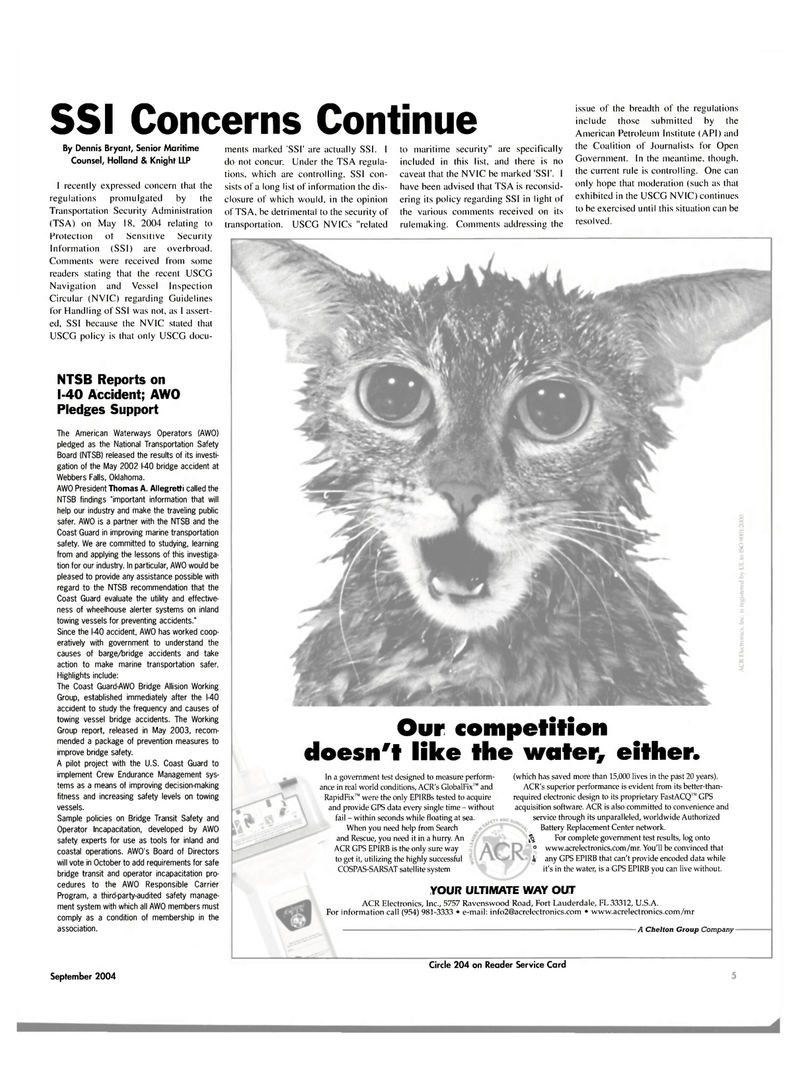
Page 5: of Maritime Reporter Magazine (September 2004)
Marine Propulsion Annual
Read this page in Pdf, Flash or Html5 edition of September 2004 Maritime Reporter Magazine
issue of the breadth of the regulations include those submitted by the
American Petroleum Institute (API) and
Protection ot Sensitive Security
Information (SSI) are overbroad.
Comments were received from some readers stating that the recent USCG
Navigation and Vessel Inspection
Circular (NVIC) regarding Guidelines for Handling of SSI was not, as I assert- ed, SSI because the NVIC stated that
USCG policy is that only USCG docu-
NTSB Reports on 1-40 Accident; AWO
Pledges Support
The American Waterways Operators (AWO) pledged as the National Transportation Safety
Board (NTSB) released the results of its investi- gation of the May 2002 1-40 bridge accident at
Webbers Falls, Oklahoma.
AWO President Thomas A. Allegretti called the
NTSB findings "important information that will help our industry and make the traveling public safer. AWO is a partner with the NTSB and the
Coast Guard in improving marine transportation safety. We are committed to studying, learning from and applying the lessons of this investiga- tion for our industry. In particular, AWO would be pleased to provide any assistance possible with regard to the NTSB recommendation that the
Coast Guard evaluate the utility and effective- ness of wheelhouse alerter systems on inland towing vessels for preventing accidents."
Since the 1-40 accident, AWO has worked coop- eratively with government to understand the causes of barge/bridge accidents and take action to make marine transportation safer.
Highlights include:
The Coast Guard-AWO Bridge Allision Working
Group, established immediately after the 1-40 accident to study the frequency and causes of towing vessel bridge accidents. The Working
Group report, released in May 2003, recom- mended a package of prevention measures to improve bridge safety.
A pilot project with the U.S. Coast Guard to implement Crew Endurance Management sys- tems as a means of improving decision-making fitness and increasing safety levels on towing vessels.
Sample policies on Bridge Transit Safety and
Operator Incapacitation, developed by AWO safety experts for use as tools for inland and coastal operations. AWO's Board of Directors will vote in October to add requirements for safe bridge transit and operator incapacitation pro- cedures to the AWO Responsible Carrier
Program, a third-party-audited safety manage- ment system with which all AWO members must comply as a condition of membership in the association.
September 2004
SSI Concerns Continue
By Dennis Bryant, Senior Maritime
Counsel, Holland & Knight LLP
I recently expressed concern that the regulations promulgated by the
Transportation Security Administration (TSA) on May 18, 2004 relating to ments marked 'SSI' are actually SSI. I do not concur. Under the TSA regula- tions, which are controlling. SSI con- sists of a long list of information the dis- closure of which would, in the opinion of TSA, be detrimental to the security of transportation. USCG NVICs "related to maritime security" are specifically included in this list, and there is no caveat that the NVIC be marked 'SSI'. I have been advised that TSA is reconsid- ering its policy regarding SSI in light of the various comments received on its rulemaking. Comments addressing the the Coalition of Journalists for Open
Government. In the meantime, though, the current rule is controlling. One can only hope that moderation (such as that exhibited in the USCG NVIC) continues to be exercised until this situation can be resolved.
YOUR ULTIMATE WAY OUT
ACR Electronics, Inc., 5757 Ravenswood Road, Fort Lauderdale, FL 33312, U.S.A.
For information call (954) 981-3333 • e-mail: [email protected] • www.acrelectronics.com/mr -A Chelton Group Company-
Circle 204 on Reader Service Card
Our competition doesn't like the water, either.
In a government test designed to measure perform- ance in real world conditions, ACR's GlobalFix'™ and
RapidFix™ were the only EPIRBs tested to acquire and provide GPS data every single time - without fail - within seconds while floating at sea.
When you need help from Search and Rescue, you need it in a hurry. An
ACR GPS EPIRB is the only sure way to get it, utilizing the highly successful
COSPAS-SARSAT satellite system (which has saved more than 15,000 lives in the past 20 years).
ACR's superior performance is evident from its better-than- required electronic design to its proprietary FastACQnl GPS acquisition software. ACR is also committed to convenience and service through its unparalleled, worldwide Authorized
Battery Replacement Center network. \ For complete government test results, log onto ° www.acrelectronics.com/mr. You'll be convinced that it any GPS EPIRB that can't provide encoded data while it's in the water, is a GPS EPIRB you can live without.

 4
4

 6
6
